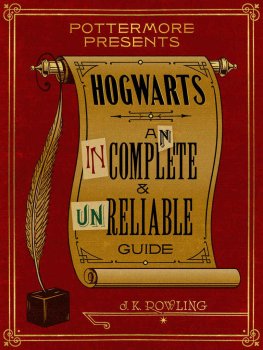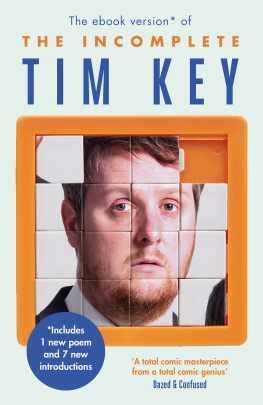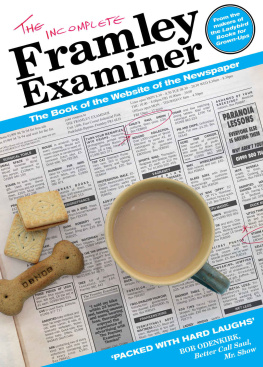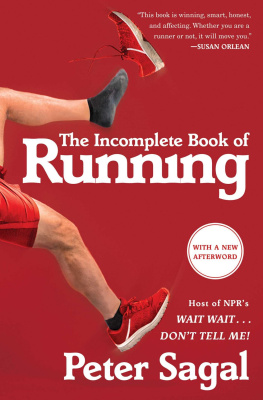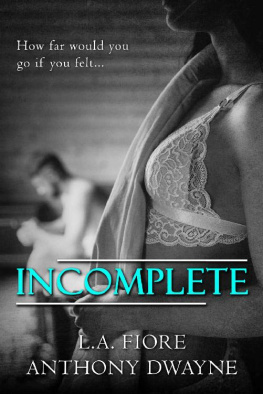Salt and Sage Books - Writing Fat Positivity: An Incomplete Guide (Incomplete Guides Book 5)
Here you can read online Salt and Sage Books - Writing Fat Positivity: An Incomplete Guide (Incomplete Guides Book 5) full text of the book (entire story) in english for free. Download pdf and epub, get meaning, cover and reviews about this ebook. year: 2020, publisher: Salt & Sage Books, genre: Romance novel. Description of the work, (preface) as well as reviews are available. Best literature library LitArk.com created for fans of good reading and offers a wide selection of genres:
Romance novel
Science fiction
Adventure
Detective
Science
History
Home and family
Prose
Art
Politics
Computer
Non-fiction
Religion
Business
Children
Humor
Choose a favorite category and find really read worthwhile books. Enjoy immersion in the world of imagination, feel the emotions of the characters or learn something new for yourself, make an fascinating discovery.

- Book:Writing Fat Positivity: An Incomplete Guide (Incomplete Guides Book 5)
- Author:
- Publisher:Salt & Sage Books
- Genre:
- Year:2020
- Rating:3 / 5
- Favourites:Add to favourites
- Your mark:
- 60
- 1
- 2
- 3
- 4
- 5
Writing Fat Positivity: An Incomplete Guide (Incomplete Guides Book 5): summary, description and annotation
We offer to read an annotation, description, summary or preface (depends on what the author of the book "Writing Fat Positivity: An Incomplete Guide (Incomplete Guides Book 5)" wrote himself). If you haven't found the necessary information about the book — write in the comments, we will try to find it.
Writing Fat Positivity: An Incomplete Guide (Incomplete Guides Book 5) — read online for free the complete book (whole text) full work
Below is the text of the book, divided by pages. System saving the place of the last page read, allows you to conveniently read the book "Writing Fat Positivity: An Incomplete Guide (Incomplete Guides Book 5)" online for free, without having to search again every time where you left off. Put a bookmark, and you can go to the page where you finished reading at any time.
Font size:
Interval:
Bookmark:



Cover designed by Blue Water Books
eBook ISBN 978-1-7349234-8-3
Paperback ISBN 978-1-7349234-9-0
Copyright 2020
All rights reserved.
No part of this book may be reproduced in any form or by any electronic or mechanical means, including information storage and retrieval systems, without written permission from Salt and Sage Books, LLC, except for the use of brief quotations in a book review.
To authors who fiercely write real people as real people.
Statistics provided reflect available information in the United States of America. We recognize that these statistics are exclusionary by nature, and encourage you to take a look at worldwide statistics to get a broader picture, particularly if your story is not set in the United States.
Dear Reader,
Im glad youre here and ready to learn more about how to write fat characters in a positive way.
Stories tell us how to feel about each other and ourselves. Heres how stories about fat people have affected my story:
When I was little, I went to the theater with my family to see The Goonies . The character Chunk is an example of what has been normal for our culture: a negative portrayal of fat children, fat families, relationships with food, and what the normal social response to those three things ought to be.
I remember my trimmer older brother pointing to the screen as the movie once again bullied Chunk for our amusement, and as other people in the theater laughed at Chunk, that older brother elbowed my other brother in his soft middle, and said, Look, its you.
Suddenly my middle brother wasnt someone who loved math, who was great at building sand castles, who loved reading Encyclopedia Brown he was fat. He was just fat. He wasnt just a person anymore, he was a fat person. And fat, the movie further explained via Chunks on-screen antics, also was synonymous with clumsy, odious, and not too bright.
I remembered that moment a few years later when my body prepared for puberty by gaining some weight, and we watched The Goonies again. Thats me , my brain said with shock. We are also an unlovable, unsightly butt of a joke. Thats us. The horror bloomed within me as I realized that I no longer had the same place in the world Id had before. I wasnt like the other kids anymore. I was different because I was fat.
It wasnt just me getting this message, eitherthe bullies at my school and in my family also understood the approval these stories gave to others to bully me into making my body more acceptable. The fatphobia was so universal, even family who meant well saw the pain society had in store for me, and warned me against making myself so unlovable. The cumulative lesson was clear: I owed it to everyone and to myself to look different.
Like so many of us voracious readers, it was during painful times in childhood that I turned to books for respite. For years the shelves of the school library had been my refuge, and once people werent safe, I turned to books to find friends. Unfortunately, they werent much better. I tried to find a representation of me, an example of how someone like me could still live life and be acceptable, but I didnt find that representation that I ached for.
Whether it was Judy Blumes Blubber , Roald Dahls Charlie and the Chocolate Factory , or even my still-beloved Baby-Sitters Club series by Ann M. Martinthese books all repeated what I heard on TV, at school, from family and friends: My body was wrong. My body was unacceptable. I wouldnt be considered worthy, or powerful, or disciplined, or beautiful, or strong, unless my body looked like the thinner bodies that were universally preferred.
I felt imprisoned, not by my own body (which actually was just a normal amount of prepubescent pudgy) but by the persistence of this painful, dehumanizing story about what fat bodies mean about who fat people are.
Nobody wants to be without story, me especially! I knew I wanted to be a writer by the time I was seven, years before my body became unacceptable, and my life was books. So, like any other human whose basic belonging is on the line, I launched into decades of struggle for my own story, for the right to be represented even just in my own head.
I spent years dwindling in anorexia, for which I received glowing praise and support. I compulsively exercised and missed out on opportunities to just be a happy child with a normal social life because I couldnt afford to risk gaining weight and losing people.
Bodies hate starvation, though, and after years of restrictive eating, my metabolism rebounded with relentless weight gain, my body telling the true story that Id subjected myself to famine for over twenty years. I became exactly the fat adult that Id spent years terrified of becoming, and Ive journeyed through life in a body of fluctuating weight since, noting with care the huge differences in how others treat me and tell my story based solely on how much I weigh.
I wish Id had good stories, loving stories, with respectful and positive representation. What I read made it clear that I could not be even a side character, let alone a protagonist, unless I had a different body. I was too fat for my story to be allowed to start, or for it to be about anything other than my journey towards reaching the minimum level of acceptable to the people around me.
Stories are teacherswhether they teach torment or refuge is up to the teller.
You, dear writer, have the opportunity to help create stories for real people to inhabit. You have an opportunity to make sure your story grants kindness and tells the truth, and the truth is that all bodies have worth, and all people deserve to live their own stories.
Thank you for taking your storytelling power seriously.
Sachiko Burton
* * *
Dear Reader,
Thank you so much for taking the time to purchase and read this guide. Fat positivity is a difficult but crucial topic to explore. We are taught through mainstream media that to be fat is to be unhealthy, weak, ridiculous, and more. If theres a negative human quality to be included in a story, odds are multiple writers have used a fat character to represent it. Too often we see ourselves portrayed as greedy villains, slapstick sidekicks, mindless eating machines, or desperate souls hungry for love (and cake).
Unpacking the many ways in which our society is constructed to be harmful to fat people is no easy task, but not for lack of material. We have enough experiences and insights to create a multi-volume series on the subject of how to write fat positive characters alone, but this is an Incomplete Guide for a reason. We arent here to teach you everything. Were here to show you just how much there is to learn and provide resources to help you do so.
This is an opening dooran invitation to see things from the point of view of multiple contributors who will share their hurts, their insights, and their requests that writers be more mindful, more intentional, and more committed to representing fat people authentically and respectfully.
Font size:
Interval:
Bookmark:
Similar books «Writing Fat Positivity: An Incomplete Guide (Incomplete Guides Book 5)»
Look at similar books to Writing Fat Positivity: An Incomplete Guide (Incomplete Guides Book 5). We have selected literature similar in name and meaning in the hope of providing readers with more options to find new, interesting, not yet read works.
Discussion, reviews of the book Writing Fat Positivity: An Incomplete Guide (Incomplete Guides Book 5) and just readers' own opinions. Leave your comments, write what you think about the work, its meaning or the main characters. Specify what exactly you liked and what you didn't like, and why you think so.

